Pathways
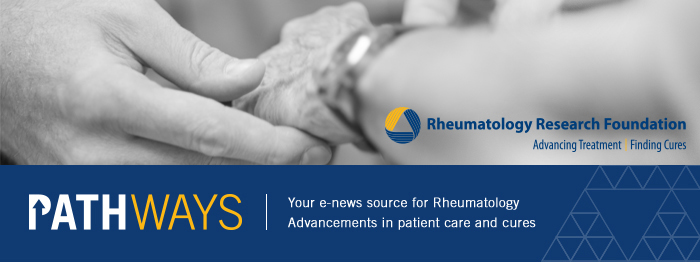
Volume 5 • Issue 6 • June 2016 • Rheumatology Research Foundation
Updates in the Search for Cures
|
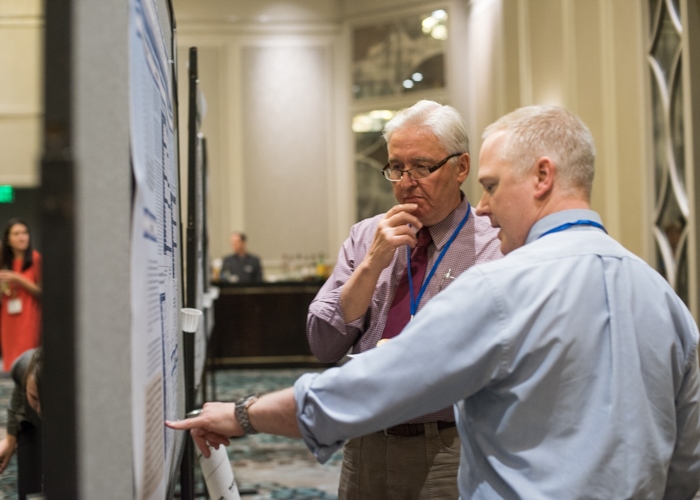 Foundation-funded researcher, Jon Giles, MD, explains updates on his work to James Witter, MD, PhD, at Investigators' Meeting. Foundation-funded researcher, Jon Giles, MD, explains updates on his work to James Witter, MD, PhD, at Investigators' Meeting.
|
The Rheumatology Research Foundation hosted the 9th annual Investigators’ Meeting in Atlanta, Georgia, on June 24 - 25. As a requirement for Foundation innovative research and pilot grant recipients, this meeting is where Foundation-funded researchers provide updates and status reports on the work they are doing to advance treatments and cures for rheumatic diseases. More than 50 attendees enjoyed presentations from 20 researchers. They also networked with one another to foster potential collaborations and build partnerships.
“This was a very successful meeting,” said Eric Matteson, MD, MPH, President of the Rheumatology Research Foundation. “I heard great discussions throughout the halls with attendees exchanging thoughts and ideas that will fuel future projects. That is exactly what this meeting is supposed to be about.”
Presentations demonstrated a variety of topics, all of which are aimed to help improve treatments and care for people living with rheumatic diseases. Timothy Niewold, MD, from the Mayo Clinic, presented on his study Type 1 Interferon as a Predictor of Anti-TNF Response. This research could determine if a blood test can be used as a predictor for whether or not a treatment will work for a patient. “We might be able to spare people who would not respond to a drug, so that we can move them on to treatments that will work for them,” he said.
|
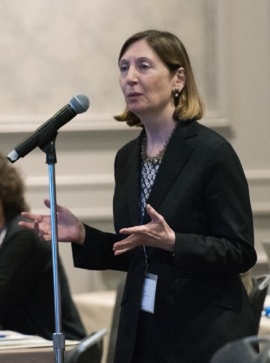 Ellen Gravallese, MD, asks a question after a presentation. Ellen Gravallese, MD, asks a question after a presentation.
|
Another presentation from Iris Navarro-Millan, MD, MSPH, from the University of Alabama at Birmingham, described efforts to create an electronic tool that patients and rheumatologists could use to communicate. The rheumatic disease activity measurement tool, also known as READY, would allow patients to record their symptoms and learn about their medications. The information reported through the tool could be used by rheumatologists as they make decisions about the patient’s treatment plan, as well as by researchers who could use the data for studies.
Christopher Ritchlin, MD, MPH, from the University of Rochester Medical Center, also presented on his study, Serum, Cellular and Imaging Markers of Arthritis in Psoriasis Patients. This work seeks to better understand which psoriasis patients are most likely to develop psoriatic arthritis, so that rheumatologists one day may be able to prevent joint inflammation and damage before such symptoms begin.
Inez Rogatsky, PhD, from the Hospital for Special Surgery, says that the diversity of topics is one of her favorite aspects of the meeting. “I like that it brings together people from different backgrounds. I can get exposed to things that I would otherwise never hear,” she says. Lindsey Criswell, MD, MPH, from the University of California, San Francisco, agrees, “It is exciting to hear from other investigators. The work is always cutting-edge and valuable for our patients.”
In addition to the Investigators’ Meeting, the Foundation also hosted the 2nd annual Partners in Rheumatology: Leadership Summit. This meeting consisted of representatives from 14 private organizations and federal institutes that have a strong interest in rheumatology research. Attendees discussed ways that the organizations can work together and share resources to build a more effective support system for the rheumatology community.
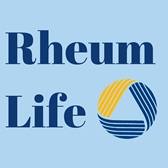 |
Meet people who are living with rheumatic diseases, and learn what the Foundation is doing to help. In this “Rheum Life” series, we will share patients' perspectives of life with rheumatic disease and feature the Foundation-funded researchers who are working to advance treatments and find cures. Visit the improving patient care page to read more stories, or share your experience by emailing us.
#RheumLife: Waiting for an Appointment
With special training in musculoskeletal and autoimmune conditions, rheumatologists play a crucial role in the care of people with rheumatic diseases. That is why the Rheumatology Research Foundation is dedicated to recruiting and training more of these experts by funding research and training opportunities for future doctors and the professors who train them.
|
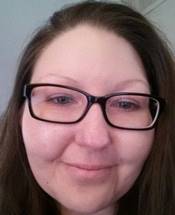 Nancy Collins Gelpi Nancy Collins Gelpi
|
Patient Perspective
As a patient, Nancy Collins Gelpi knows what it is like to wait for an appointment. “It is very hard to get an appointment at my rheumatologist’s practice; they are so busy. I've heard of people waiting a year to get a new patient appointment. If the rheumatologist says he wants to see you back in 8 weeks you're lucky if they can schedule you back in by 12 weeks. Also, my rheumatologist is of retirement age. I’m not sure where I'll go when he retires," she says.
|
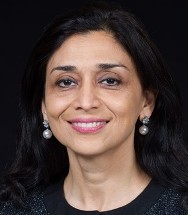 Dr. Uzma Haque Dr. Uzma Haque
|
The Efforts to Help
With the Foundation funding, Uzma J. Haque, MBBS, MD, from John Hopkins University is developing an interactive web-based rheumatology curriculum to expose doctors-in-training to rheumatology. The curriculum will be published on the John Hopkins Physician Education & Assessment Center, an educational website that is used by nearly 200 training programs and 11,000 future doctors. This training prepares primary care providers for diagnosing and treating patients with rheumatic diseases, while also encouraging more future doctors to become rheumatologists.